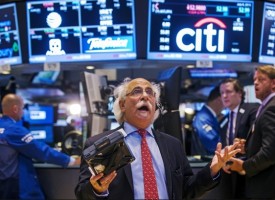On the heels of continued volatility in global markets, today one of the top economists in the world sent King World News a powerful piece discussing the problems investors are now facing as the world edges closer to the next crisis. Below is the fantastic piece from Michael Pento.
By Michael Pento of Pento Portfolio Strategies
December 13 (King World News) – Do Investors Need To Worry About A New Set Of Problems?
We have happened upon that time in the investment cycle when investors vastly eschew active management of their assets in favor of a more passive management style. In fact, I read recently 461 Hedge Funds, a hallmark of active investment management, shut their doors in the first half of this year alone. If liquidations continue at that rate, they'll outpace the 1,023-closure record from 2009. All signs now indicate that active management has fallen out of vogue….
Continue reading the Michael Pento piece below…
Advertisement
To hear which company investors and institutions around the globe are flocking to
that has one of the best gold & silver purchase & storage platforms
in the world click on the logo:

And why wouldn’t it? Index funds have done very well these past few years; whereas active managers have underperformed the major averages. The problem is when everyone piles into or out of the same investment philosophy, it usually signals it’s time to change course. Therefore, I predict the tides will soon change and active management will make a huge comeback.
Passive investing, such as Index mutual funds, is an easily understood investing style that allows you to access broad segments of the market. Indexing has been called investing on autopilot. This is a strategy that tends to work well, until it doesn’t. Take the mid to late 90’s, when it appeared the stock market would always go up. Everyone from your hairdresser to the cab driver was a stock genius. New websites such as the Motley Fool preached that you didn’t need an investment advisor — just buy a broad basket of stocks (especially in the technology sector) and you would get rich. And if you got out before March 10, 2000, you were all set.
However, if you failed to get out at the right time, we all know what happened — your portfolio quickly crashed and caused the loss of $5 trillion in the market value of companies from March 2000 to October 2002. During this time, only managers who offered a long/short and dynamic asset allocation strategy produced positive returns.
Another feature of the passive investment approach argues that you don’t have to actively manage your investments as long as you stay diversified. This is referred to as the Modern Portfolio Theory (MPT). MPT is a mathematical formulation that creates diversification in investing, with the aim of selecting an assortment of investment assets that have a collectively lower risk than any individual asset. This is possible, so the theory goes, because different types of assets often change in value in opposite ways. For example, the stock market often moves in a different direction from yields in the bond market. Therefore, a pool of both types of assets can nearly always, in theory, offer lower overall risk than holding just one asset class exclusively.
But this doesn’t always work. Consider the 1970’s, a time when stock prices fell, while bond yields soared. Investors who remember the protracted bear market of 1970-1982, know that during this time both stock and bond prices went down in tandem.
During the 1960’s, investors were persuaded to enter into a basket of large-cap stocks called the Nifty Fifty. If they were diversified, as the MPT suggested, they would have also been in bonds yielding around 4%-5%. The Nifty Fifty coupled with your 4%-5% bond would have worked pretty well during this time period, until it didn’t. Holding this diversified portfolio would have left you in a house of pain during the mid and late 1970’s, as the S&P 500 dropped around 50% and the 10-Year Treasury note went from 4%, to over 15% by 1981. The stagflation in the 1970’s caused both stocks and bonds to fall in tandem.
So where are we now? I have stated for a while that it is my belief the United States—along with the rest of the developed world—are facing an entirely new paradigm. Namely, that such onerous and record debt levels have now reached a point where government revenue will become woefully insufficient once interest rates normalize. Therefore, the developed world must choose the manner in which they will default on the debt. Central banks will be forced to either monetize mountains of debt, or allow a deflationary depression to wipe out the economy.
With bond yields already at historic lows, brought about artificially by massive central bank manipulation of bond prices, the next time a recession occurs it is much more likely we will have a debt crisis due to a lack of revenue available to service government debt.
The European bond crisis was all about such a fiscal disaster, not the prevailing rate of inflation at that time. Investors did not flock into the “safety” of bonds during the financial crisis of 2008. Instead, the Greek 10-Year Note, which averaged around 5% just prior to the crisis, soared to nearly 40% by March 2012. However, the rate of inflation averaged just 1.5% during that same time frame. Bond yields soared because owners of sovereign debt became assured that Greece would either have to pay investors back in worthless currency or renege on the principal and interest of its debt. As it turns out, Greece used both methods of default.
A true fiscal crisis always leads to sovereign default—either through inflation, a debt restructuring or both. Another recession similar to the Debt Crisis of 2008 will most likely bring down both stock and bond prices. Only this collapse in bond prices may not be caused by inflation right away, but instead will be the result of a severe revenue dearth due to a collapsing economy. A diversified portfolio of Index and bond funds will not provide much security in this case.
The easy monetary policies of global central banks have not only brought about serial asset bubbles, but these market manipulators have also created a new bubble…one where most investors have been lulled to sleep with a false feeling of comfort. What they believe to be a diversified portfolio may instead prove to be a group of highly-correlated asset classes.
These investors are also convinced that they have become buy and hold geniuses, duped by central banks into believing the passive management style of investing can never fail. But if stock and bond prices plunge together in the next recession, investors will then flock back into the active management style of investing, as they realize the need to have a manager who can not only move between asset classes (including precious metals), but also has the flexibility to profit from a decline in the market.
To learn more about Michael Pento’s financial management services CLICK HERE. You can also subscribe to Michael Pento’s weekly podcast.
IMPORTANT – KWN has many more interviews being released today.
© 2014 by King World News®. All Rights Reserved. This material may not be published, broadcast, rewritten, or redistributed. However, linking directly to the blog page is permitted and encouraged.
The audio interviews with Stephen Leeb, Andrew Maguire, John Embry, Gerald Celente, Rick Rule, Bill Fleckenstein, Ben Davies, Greyerz-Turk-Stamm, David Stockman, William Kaye, Eric Sprott, Rick Santelli, John Mauldin and Marc Faber are available now. Other recent KWN interviews include Jim Grant and Felix Zulauf — to listen CLICK HERE.







